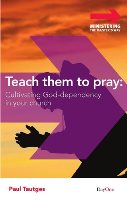Okay, we’ve all seen new books on prayer, many times over, but somehow we have trouble finding that book that will actually prove helpful in transforming our prayer lives – and the corporate prayer lives of our church. Teach Them to Pray: Cultivating God-Dependency in Your Church, by Paul Tautges, is one of those little books that you need to purchase by the box and distribute to your entire church. It is not a large book, but it is remarkably good – in a practically helpful kind of way, that is.
Dr. Paul Tautges is our Review Editor for Counseling here at Books At a Glance, and – quiet as he is – we only just recently learned of his 2009 book from Day One Publications. But now that we have read it, we are eager to talk to him about his valuable contribution.
Books At a Glance (Fred Zaspel):
Let’s start at the bottom: What is prayer?
Tautges:
Prayer is a lifestyle of God-dependency; it is an expression of our reliance upon God and an essential aspect of fulfilling God’s will for our lives.
Books At a Glance:
Explain the place of prayer in the life of the early church.
Tautges:
To the early church, regular prayer gatherings were an indispensable part of their very existence. Their earnest devotion to prayer resulted in their being passionately united in mind concerning the work of spreading the gospel. Devotion to prayer turned common people into uncommon servants of God.
Books At a Glance:
What does this attention to prayer say about those early Christians?
Tautges:
The early believers understood how weak they were apart from reliance on Christ; they truly believed that power was inherent in the gospel, not in them. Their dependence upon God in prayer was evidence of their belief in the daily sustaining power of the Holy Spirit.
Books At a Glance:
What is significant about praying “in Jesus’ name”? What does it mean and why is it important?
Tautges:
Jesus said to Thomas, “I am the way, and the truth, and the life; no one comes to the Father, but through Me.” The point is, no one can approach God without repentant faith in Jesus Christ. Without Jesus as our righteous Mediator we are the enemies of God, but through faith in Him we become the children of God. “In Jesus’s name” is not a three-word formula attached to the end of our prayers that mechanically secures God’s stamp of approval upon our requests. Instead, praying in Jesus’ name reflects a person’s recognition of God’s grace in Christ and the submission of his or her heart (mind, emotions, and will) to the will of God for the glory of God. “In Jesus’ name” is not a magical phrase that somehow guarantees that our every prayer will be answered in accordance with our desires. It is an honest, humble acknowledgment that we cannot utter one acceptable word to God without the intercession of Jesus Christ. True prayer is also a heartfelt surrender to God’s good and perfect will, which leads to the ultimate display of His glory in our lives. This is why Jesus could make the claim that “Whatever you ask in My name, that will I do” (John 14:13).
Books At a Glance:
Give us some suggestions that will help us when we gather together corporately to pray. We all seem to have the “prayer for the sick” requests down pretty well, but surely there is more. How can we develop better prayer meetings … and a more productive and more biblical personal prayer life?
Tautges:
Throughout my pastoral ministry, my custom has been to teach on prayer before we pray. Usually, I taught a 20-minute expositional Bible lesson and then specifically demonstrated how to apply it to prayer. This was then followed by an average of 30 minutes in corporate prayer (usually in small groups of 3-5). As a result, our prayer meetings were just that, gatherings to pray. In too many churches, the weekly prayer meeting has become something to keep the adults busy while the kids’ program does its thing. Instead, gathering to pray needs to become a high priority in the life of a local church. This will not happen without consistent teaching on prayer.
Also, one of the most profitable disciplines that I ever taught my congregation was how to pray through Scripture. Praying through Scripture is taking a passage of Scripture and praying it back to God, basing our requests on what the passage says about God and making specific supplication in ways that are in keeping with God’s revealed will. I guess the bottom line is that I tried to use the corporate prayer time to train us to think biblically, to have a biblical mindset of prayer, to cultivate a life of God-dependency that goes with us wherever we go.
Books At a Glance:
What suggestions can you give to pastors for helping their congregations learn better to pray?
Tautges:
It is my conviction that most believers need to be taught how to pray, not methodologically, but theologically. Over the course of two decades of pastoral ministry, I found that God’s people prayed most effectively when their prayers were guided by an accurate theology of God and how we are to approach Him. By continually teaching the biblical commands concerning prayer, our prayer meetings became so much more than reciting a list of weekly needs back to God. They became times of deep, intimate communion with God as a body of believers. My chief suggestion to pastors is simply this: Teach your people to pray.
Buy the books

TEACH THEM TO PRAY: CULTIVATING GOD-DEPENDENCY IN YOUR CHURCH
